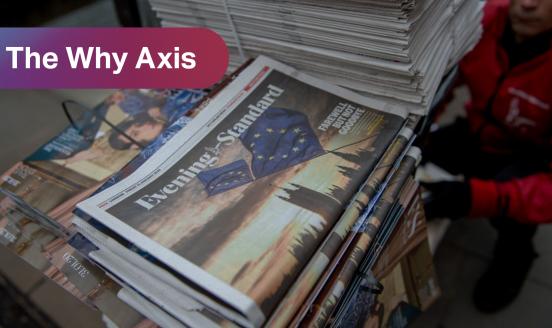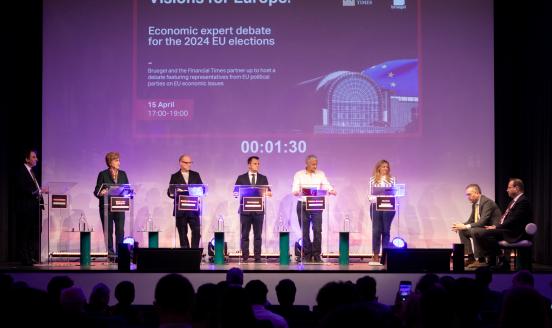Spitzenkandidaten visions for the future of Europe's economy
What are the different political visions for the future of Europe’s economy? Bruegel and the Financial Times organised a debate series with lead candi

For the full recordings visite the Spitzenkandidaten Series page
European elections are coming, sending voters to the polls to weigh in on the European Union’s next leadership slate. For the second time, the European political families have selected lead candidates as the headliners of their campaign. The system known as Spitzenkandidaten puts a face on each of the parties, their preferred choice for the position of European Commission president.
It’s not an automatic or direct election to the president’s post. The job theoretically would go to the political family that would be able to gather enough support in the European Parliament as well as the European Council, according to treaty provisions. The result is less clear-cut than one might expect. Coalition-building and intergovernmental negotiations will play a major role. But the Spitzenkandidaten are there, they are the main faces of the campaign, and one of them will eventually get the job if all conditions met.
To work well, the process should create a balancing act between individual candidates and party platforms. This is something to bear in mind when analysing the candidates’ positions and the overall campaign messaging, as part of future possible coalition building and negotiations.
Together with the Financial Times, Bruegel recently grilled six candidates on economic issues we consider will be the most important for Europe in the five years ahead. Here are some of their main points:
EUROPEAN CHAMPIONS
Is EU competition policy working? What would you do differently?
I criticise a very big part of the German-French proposal,which is the idea that the national member states can overrule the Commission. That’s the end of the internal market.
Bas Eikhout, European Green Party
Bas Eikhout, one of the two lead candidates for the greens, said EU competition powers need to stay with the Commission, be less technocratic, take greater account of global conditions, and leave more room for political judgement. However, Eikhout criticised the German-French stance on the best role for individual countries. He said it is important that member states do not go against the EU competition laws or feel that they can override EU laws.
The moment you allow states to do a quid pro quo, where I let you [have] this national champion and you let me have this national champion, the whole European project is going to disappear.
Luis Garicano, Alliance of Liberals and Democrats for EuropeParty
Luis Garicano, one of the seven members of ALDE's "Team Europe", backed a ‘tough cop’ approach to competition policy and urged authorities to step up to maintain a level playing field across Europe. He offered one caveat: in the face of enhanced competition in digital platforms from China and the US, the EU should take an approach to digital superpowers that acknowledges the ‘winner takes all’ tendency that has dominated the sector.
It’s absolutely wrong to use the Siemens-Alstom as an example of the need for another industrial policy. Creating an effective monopoly in the European market would have led to most European travellers on trains [having] to pay more for the train ticket.
Frans Timmermans, Party of the European Socialists
Frans Timmermans argued that competition policy should not be a stand-in for industrial policy. He offered a strong defence of the decision to block the Siemens-Alstom merger. At the same time, he said the EU may need to be more proactive in helping its industries plan for the future, saying the creation of Airbus could serve as an example for helping launch a European player in automotive batteries, for example, or another emerging manufacturing sector.
What we do need is companies that compete, and in the process of competing they are investing in creating quality jobs. To create another cartel in Europe is the last thing we need.
Yanis Varoufakis, Democracy in Europe Movement 2025
Yanis Varoufakisbacked the current European competition legislation. He said Google did not come about because people in Silicon Valley cooperated to create a giant through anti-competitive measures. Rather, it was the result of competition, innovation, and risk-taking. He stated that creating an environment such as this is the best way for Europe to compete with the US and China.
We have to understand that competition is already on a global scale and that we need global European champions. I want to have more Airbus companies who are, on a global level, so competitive and so strong.
Manfred Weber, European People’s Party
Manfred Weber has been one of the more outspoken critics of the decision to block the Siemens-Alstom merger and he called for a more global European approach. He said competition rules should be adapted to allow for the development and protection of European champions in sectors considered to be strategic.
Commissioner Vestager did a brilliant job in trying to create a level playing field for businesses, fight monopolies, and not having single champions.
Jan Zahradil, Alliance of Conservatives and Reformists in Europe
Jan Zahradilsupported, overall, the current approach to competition policy. He said Chinese companies who do not abide by competition laws should be denied market access to the EU until they comply with fair competition laws. He said Europe should build such a level playing field.
TRADE, TRUMP AND CHINA
How should European policy address the EU’s biggest global competitors?
The European Union has huge negotiating powers because of the strength of our market, but then the moment when we are doing international negotiations, when we are very tough in words (…) then Trump says “boo” (...)and we are immediately backing off. This is of course not the credibility that Europe will deserve when doing future trade deals, let alone when negotiating with China.
Bas Eikhout, EGP
Eickhout said all trade deals should include the sustainable development goals and that trade policy should be amended,such that the EU inspires other countries to embrace the Paris Agreement. He said he would refuse to negotiate with the United States as long as they refuse to adopt the Paris climate accord.
The view that Europe can ride the Chinese tiger is short-sighted, and the tiger will eat us up. The only way for Europe to bring change in this relation is to stand together with the US.
Luis Garicano, ALDEParty
Garicano said that “the West” made a fundamental error in assuming China would eventually liberalise politically when they were accepted into the General Agreement on Tariffs and Trade(GATT)and the World Trade Organization (WTO)after liberalising economically. He believes that China’s failure to protect human rights, workers’ rights, and intellectual property rights should not be tacitly condoned.
At the same time, he did not support Trump’s way of dealing with these issues through the application of bilateral tariffs.
We did reach an agreement with the Chinese and we do see that the Chinese would also like to maintain WTO rules (…) If we maintain the multilateral system and stay on our values, then Europe [remains]this continent which is attractive to many many other parts of the world.
Frans Timmermans, PES
Europe needs to take a united and pragmatic stance on trade, Timmermans said. Minimising internal party divergences on the topic, Timmermans reiterated his support for trade negotiations with the US, building on conversations with like-minded pro-trade members of Congress.
However, in a political scenario where EU-US trade negotiations have become essentially transactional, he said the need for the EU to negotiate as a bloc, to fully protect its interests, is even more clear.
We are very worried about trade wars. Trade wars are detrimental to the interest of the planet and humanity. But look at the way in which Donald Trump managed to divide Europe and increasingly to rule over us.
Yanis Varoufakis, DiEM25
Varoufakis said the European response to American tariffs has increased tensions between France and Germany over the protection of their respective national car industries. He expressed a desire to formulate a coordinated retaliatory plan that would ensure Trump learns he cannot bully Europe on trade issues. He said European trade policy is not going to be successful or competitive on a global scale while we are not more united and integrated in Europe.
China is a strong partner on trade, but also on the Paris Agreement, climate change, so we have a lot of fields where we have a common thinking, a lot of problems where we have a problematic understanding, on human rights and so on (…) That’s why, yes,partnership–but level playing field.
Manfred Weber, EPP
Weber took a clear stance on geopolitical matters, underlining how the EPP is the only political group unambiguously in favour of free trade agreements and arguing that Europe should bring its naivety vis-a-vis foreign, and in particular Chinese, investments to an end. Similarly, he said, a commitment to multilateralism should not prevent Europe from taking stock of the changing position of the Trump administration, in order to protect itself from undesirable developments.
We have to introduce certain mechanisms of control, but on the other hand China is and has been a strategic partner, there were strategic partnerships signed between the European Union and China back in 2003. We do not take it first and foremost as a geopolitical rival. So, I think that we do not need to follow, even if Mr Trump asks for that, we do not need to follow the very strict US approach.
Jan Zahradil, ACRE
Zahradil said he wants the EU to continue to present a unified trade agenda,and advocated for EU retaliation to US tariffs. At the same time, he also said that individual EU states will need to pursue their own interests, and he did not see the recent 16+1 summit in Dubrovnik as a Chinese attempt to subtly divide Europe between east and west.
THE EURO: BRIDGING THE DIVIDE
How should the EU tackle growth and inequality in its member states?
A real investment plan that is really helping in getting convergence. That also means yes,we want to change the rules of the Stability and Growth Pact because we do feel that is too little room for investment,especially in economic problematic times.
Bas Eikhout, EGP
Eikhout said the EU needs "more democratic control" on fiscal policy, not just a spreadsheet like the Dutch government might want. He supported taking measures to increase solidarity within the eurozone, and the creation of Eurobonds as one of the means to achieve this. He advocated for creating Eurobonds at 60% because this will incentivise member countries to decrease their debt levels before joining.
Extra growth is going to come from the ability to innovate, and to invest, and to have ideas, and appropriate the return [on]investment of those ideas. That is going to require human capital, is going to require institutions.
Luis Garicano, ALDE party
Garicano was not afraid to voice criticisms of the current EU policies toward economic convergence and fiscal harmonisation. He is of the opinion that the inequalities between regions in the EU is unacceptable and serves to feed the fire of populism. He emphasised that the EU needs to focus more on creating strong institutions in struggling regions because this will lead to the innovation and investment needed for better economic growth rates.
For the future of the European cohesion policy we need to establish relationships of redistribution also between these huge urban areas,where all the innovation takes place with the new economies being very successful, and areas close, relatively close to them that are suffering because of this.
Frans Timmermans, PES
Timmermans supported the idea of fiscal transfers between countries to promote convergence. He said the difficulty in selling such an idea in the EU – through structural funds or, more ambitiously, through Eurobonds – is fundamentally an issue of moral hazard. He advocated for flexibility on budget rules, adding that kicking Greece out of the euro would have been a disaster.
The euro was in the end pointless because the greatest convergence did not happen within the eurozone. The greatest convergence happened between the successful countries in the eurozone, like Germany and the Netherlands,and countries like Poland, Hungary, and the Czech Republic.
Yanis Varoufakis, DiEM25
For Varoufakis, the Commission needs to change their rules in a way that allows them to be enforced. He said the Commission needs to reform the fiscal contract so that it works for all countries, including those that don’t respect the rules because they have a surplus. He advocated incentivising fiscal restraint by providing investment from the European Investment Bank for the economies that do comply with recommended fiscal policies.
Ten years ago, we had the need as Europeans, as [a] eurozone, to go to the IMF to ask the IMF to help us with money and with knowledge (…) But today I tell the Europeans in the future possible crisis times–hopefully they will never come, but if they come–as a European politician I want to be independent from the White House. I want to stand on our own feet.
Manfred Weber, EPP
Weber said he wants to establish a European Monetary Fund. He also supported bolder decisions in the realm of taxation, suggesting that the unanimity rule might be suspended in special cases, such as the taxation of digital giants, although the general principle of competition, on tax systems too, must be preserved. He suggested linking the disbursement of regional funds to a respect for the rule of law, to be assessed by a neutral body focusing on corruption, judiciary and media freedom. While emphasising the need to channel private savings into productive investment, Weber strongly refuted the idea that taking on more public debt could lead to sustainable growth.
A precondition for a good growth doesn’t mean that you necessarily be a member of the eurozone (…) We are promoting a multi-currency union instead of one-currency union,so what I would be in favour of would be to legally put all currencies under one legal umbrella so they would be all made equal.
Jan Zahradil, ACRE
Zahradil wanted it to be relatively easy for countries to leave the eurozone and adopt their own currency if they are not able to meet the requirements laid out in the Stability and Growth Pact. He said if the legal process for leaving the euro is improved, then such an action would be able to occur smoothly without a negative reaction from the market.
TO SUM UP
Despite the usual belief that European politics happens by consensus, the positions outlined by the candidates are quite revealing of the differences at play. Everyone agreed there is a need to change the euro area’s budget rules and reform the euro area, but no one really agreed on similar measures to be taken for such purpose. On China, they were divided among those supporting a harder line and cooperation with the USA, those that embraced a middle path of cooperation, and those who proposed turning to the Chinese as allies in support of global multilateralism. On the Siemens-Alstom merger, everybody except Weber thought it was a good decision by the Commission to block the merger, and on competition policy everyone agreed there should be European rules, but not which rules required revision.
All these positions must be read in light of the aforementioned context of balancing acts between parties, and among individual personalities. When read in this perspective, the Spitzenkandidaten process clearly starts a debate that will continue in the plenary of the European Parliament.
The strength of the process lies exactly in the centrality of the Parliament, rather than the personalisation aspect. In fact, the Spitzenkandidaten process might better be understood within the frame of parliamentary systems, such as Germany or Italy, rather than presidential ones. If the process is not mistaken for a presidential election in disguise, then it reveals a reinforced role of the parties, coalition building, but also internal politics within the parties to identify their lead candidate and communicate more clearly with the electorate.
What is certain is that the role of the European Parliament has increased – not only in defining the political agenda, but also in choosing the next president of the European Commission. The results of the elections will therefore play a critical role.
The author thanks Rebecca Christie for the support, as well the moderators from Bruegel and the Financial Times that joined in for the six events of the series.



